Jan. 23, 2018
'If you're walking down the road and see a turtle on a fence post, it didn't get there by itself'

Order of Canada recipient Marie Delorme.
Marie Delorme
On Dec. 29, 125 appointments to the prestigious Order of Canada were announced — eight from the University of Calgary community. Marie Delorme, PhD ’12, was honoured for her entrepreneurial leadership and commitment to promoting opportunities for women and Indigenous Peoples in Canada.
With an interdisciplinary PhD in anthropology, sociology, and business, her research focused on intercultural leadership in the context of Indigenous/non-Indigenous economic development. Today she is the CEO of the highly successful Imagination Group of Companies, and is involved in a variety of boards, organizations and committees.
UToday heard from Delorme about her education and vision.
Q: What does receiving the Order of Canada mean to you?
A: This truly is a very special honour. However, the reality is that none of us are able to achieve in life without the support of many people along the journey. A friend once told me, “If you are walking down the road and see a turtle on a fence post, know that it didn’t get there by itself.”
Q: How did your educational experience at UCalgary shape your path to becoming the CEO of The Imagination Group?
A: I started The Imagination Group in 2000 as a little idea to assist Indigenous artists with copyright and marketing of their work. Today, almost three dozen artists honour us by allowing the reproduction of their work. That company has grown into a full-service branding and promotional products company offering over 250,000 products. We also have three other companies.
I pursued the doctorate at the University of Calgary a number of years after becoming an entrepreneur. However, the support of the university throughout this journey has had a profound impact on my life and career.
I could not have navigated that academic process without the guidance of my team of advisers, Dr. Jim Frideres, Dr. Jacqueline Ottmann, Dr. Doyle Hatt, and the late Dr. Julie Rowney, who challenged and encouraged me over the four years. My PhD is relevant to the work I do with clients across the country, as much of my focus is on the tripartite relationship between Indigenous people, industry, and governments.
Q: What were some of the biggest challenges in your career so far?
A: Making the decision 18 years ago to leave an executive position in a large telecommunications company to become an entrepreneur was without a doubt the most daunting and riskiest endeavour of my career. It has also been the most rewarding, adventurous, and transformational adventure!
Q: You have an impressive roster of affiliations with Indigenous and women’s groups. Can you talk about your personal commitment to these groups, and the importance of fostering specialized support for Indigenous and female business leaders?
A: The organizations I am affiliated with mirror personal values and interests that are close to my heart. Some of these organizations include the RCMP Foundation’s work with youth at risk; the Coady International Leadership Institute Indigenous Women in Community Leadership program; the Canadian Centre to End Human Trafficking; and the National Indigenous Economic Development Board, which is an advisory body to the federal government.
Over the last few decades, some incredible Indigenous women leaders have fought to end 140 years of inequality and discrimination against women in the Indian Act. Women like elder Mae Louise Campbell, Jamie Goulet at the Clan Mothers Healing Village in Winnipeg among many, many others are focusing on the diverse knowledge, experience, and perspectives of Indigenous women as role models, community leaders, business leaders, academics, elected officials, and professionals. However, there is a giant chasm as Indigenous women are under-represented in almost all leadership roles. The change will only occur through collaboration between academia, industry, government … led by Indigenous women for Indigenous women.
Q: What was it like to be a professional facilitator for the University of Calgary’s Indigenous Strategy as it moved from consultation to development to inception?
A: The university is to be congratulated on the comprehensive, inclusive, and consultative engagement process utilized in establishing the strategy. My role was facilitative in nature and provided me with the unique opportunity to see the creative and collaborative process that resulted in a powerful visual model to represent the work of so many people in the university and its communities of interest. I truly appreciate the invitation to engage in this small element of the initiative.
Q: What do you see for the future of Indigenization at the University of Calgary?
A: Indigenizing the academy is a complex, transformational process. The future will be about creating a tapestry that weaves Indigenous knowledge, history, culture, and people into the fabric of the university. This is a journey that involves all people, Indigenous and non-Indigenous.
The university has been diligent in its engagement with the community in creating its Indigenous Strategy — ongoing and meaningful engagement is critical if it is to embrace and operationalize the strategy. Additionally, proper internal communication will be vital to ensure every student, administrator, and staff member understands the direction. When there is a communication vacuum it will inevitably be filled with misinformation.
In order to move forward in a good way, we must include Indigenous voices, knowledge, and wisdom in research and learning. The ethical application and recognition of the plurality of Indigenous ways of knowing presents opportunities for integration in all faculties.
ii’ taa’poh’to’p, the University of Calgary’s Indigenous Strategy, is a commitment to deep evolutionary transformation by reimagining ways of knowing, doing, connecting and being. Walking parallel paths together, ‘in a good way,’ UCalgary will move towards genuine reconciliation and Indigenization.
